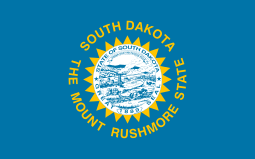Arthur C. Mellette
| Arthur C. Mellette | |
|---|---|
 | |
| 1st Governor of South Dakota | |
|
In office November 2, 1889 – January 3, 1893 | |
| Preceded by |
Himself as Governor of Dakota Territory |
| Succeeded by | Charles H. Sheldon |
| 10th Governor of Dakota Territory | |
|
In office March 22, 1889 – November 2, 1889 | |
| Preceded by | Louis K. Church |
| Succeeded by |
John Miller as Governor of North Dakota Himself as Governor of South Dakota |
| Personal details | |
| Born |
June 23, 1842 Henry County, Indiana |
| Died |
May 25, 1896 (aged 53) Pittsburg, Kansas |
| Resting place | Mount Hope Cemetery, Watertown, South Dakota |
| Political party | Republican |
| Spouse(s) | Margaret Wylie |
| Alma mater | Indiana University |
| Profession | Attorney |
Arthur Calvin Mellette (June 23, 1842 – May 25, 1896)[1] was the tenth and last Governor of the Dakota Territory and the first Governor of the State of South Dakota.
He is the namesake of Mellette, South Dakota and Mellette County, South Dakota.[2]
Biography
Mellette was the son of Charles Mellette and was born in Henry County, Indiana. He was educated at Marion Academy in Marion, Indiana. In 1862, Mellette entered Indiana University as a sophomore and graduated in 1863. On October 6, 1864, he enlisted in Company H of the 9th Indiana Volunteers, serving as a conscripted soldier until mustering out on September 28, 1865. He served in the army as a substitute for his older invalid brother and experienced many humiliations as a result. In 1866, Mellette graduated from the School of Law at the Indiana University and went to Muncie, Indiana, where he began practicing law with Thomas J. Brady. On May 26, 1866, he married Margaret Wylie.[3]
Career
Mellette was elected as district attorney for Delaware County, Indiana. In 1870, Mellette purchased the Muncie Times, a newspaper which became influential and prosperous under his tutelage. During that same year, Mellette was elected the county superintendent of schools.
When his wife became ill, Mellette visited western states to find a climate that would be more beneficial to her. Mellette's family eventually settled in Springfield, Dakota Territory, for two years; and, Mellette served as register of the United States Land Office in Springfield until the land office was moved to Watertown, Dakota Territory, in 1880. In October 1885, the Republicans nominated Mellette for governor of Dakota Territory. In November 1885, Mellette ran unopposed for the office of governor; and, voters selected Huron as the temporary capitol of Dakota Territory. In 1889, voters approved the new constitution for South Dakota and elected Arthur C. Mellette as South Dakota's first Governor. On November 2, 1889, President Benjamin Harrison signed the proclamation to make South Dakota the fortieth state. Mellette County, South Dakota is named in his honor.
The Civil War Diary of Arthur Calvin Mellette was edited in 1975 by Gerald W. Wolff, retired historian from the University of South Dakota through auspices of the South Dakota Historical Association.[4]
Death
The family made what was meant to be a temporary move from Watertown to Pittsburg, Kansas in 1895. Mellette died May 25, 1896 while in Pittsburg.[5] His body was sent back to Watertown and interred in Mount Hope Cemetery.[6] His former home in Watertown is maintained as a museum.
References
- ↑ "Arthur C. Mellettte". Find A Grave. Retrieved 31 August 2012.
- ↑ Federal Writers' Project (1940). South Dakota place-names, v.1-3. University of South Dakota. p. 50.
- ↑ "Arthur C. Mellette". Mellette House. Retrieved 31 August 2012.
- ↑ Gerald W. Wolff (ed.). The Civil War Diary of Arthur Calvin Mellette. South Dakota State Historical Society, ISBN 99940-819-2-6. Retrieved December 11, 2010.
- ↑ "Arthur C. Mellette". Mellette House. Retrieved 31 August 2012.
- ↑ "Arthur C. Mellette". Find A Grave. Retrieved 31 August 2012.
External links
- Arthur C. Mellette's "Dakota Profile" biography
- Arthur C. Mellette's "Weekly South Dakotan" biography
- Arthur C. Mellette's biography at the Historical Society of North Dakota website
- Arthur C. Mellette's burial record at Findagrave.com
- Mellettehouse
| Political offices | ||
|---|---|---|
| Preceded by new office |
Governor of South Dakota 1889–1893 |
Succeeded by Charles H. Sheldon |
